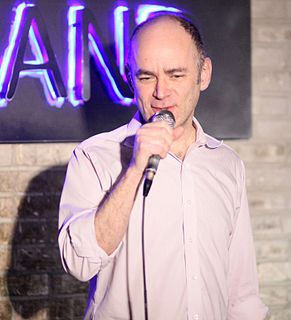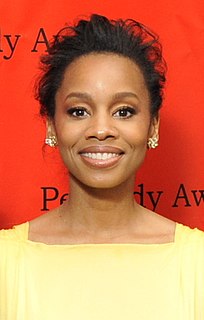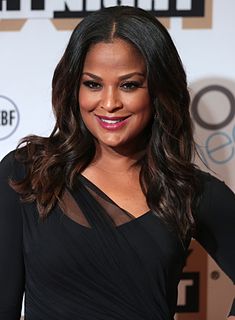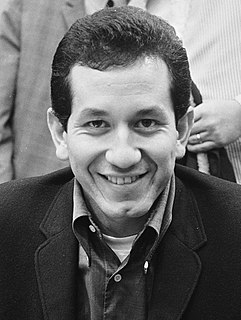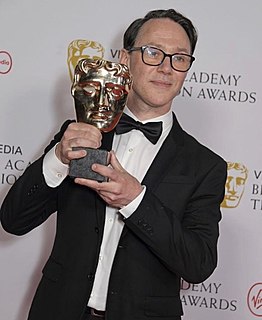A Quote by Todd Barry
I've had shows where you think, "Is this going well? I can't tell," and then you say goodnight and you get this ovation. They're sorta like a theater audience. I've learned that much; that they're not always going to be doing backflips - but I'll never figure it out. Because sometimes you walk up there, and they're so excited, and then other times, it's just... But sometimes an audience is bad, and you can tell them they're bad, and that sort of breaks the ice a bit.
Related Quotes
For me, I felt bad for people asking the questions, cause you know their boss sent them out saying, 'Get me something on Mission Impossible.' And you ask the question, and it's just a polite, 'I'm not going to tell you.' Then, every so often, they'd go, 'Well, can't you just tell us a little bit?' I have to say, 'You know what guys, I'm under contract and I'm not going to tell you anything.' So you keep asking the questions and I'm just going to keep smiling. And it's hard, cause I don't want to seem rude, but it's part of my job just like it's part of their job to keep a secret.
You can't expect everyone to laugh or applaud you for doing edgy things. Sometimes you'll miss. But I think comedians are artists and there's a value in failure. It kind of works both ways between comedians and audiences. The audience has to understand that comedians are going to sometimes tell a joke that doesn't work out with dark subjects, and the comedian has to understand that sometimes they 'll fail and it's not the audience's fault for not getting it or loving it.
I think the New York theater audience is very savvy. Sometimes you get newbies who think they're going to be watching Smash onstage, and sometimes you have people who have been coming to theater for years. It's the combination of those people in an audience that makes for a pretty amazing night - their ability to give each other permission to react and enjoy, in a way that maybe they wouldn't if they weren't sitting next to each other.
If you're having a bad day the main thing on the mental side is realizing that I'm having a bad day and thinking about why and then just kind of re-prioritizing and saying, "I'm going to let myself have this bad day, but tomorrow I'm going to get back on track." That's pretty much it. We all have them. You do have to let yourself have them and then go within and figure out why you're having it and prevent it from happening again.
Sometimes it's not catastrophic. Sometimes you only come to the bottom of your coffee cup. Sometimes you have a good day. No one wants to know. No one wants to tell you about theirs either. You might somehow take it. Turn it against them. See the flaw. You always tell them the whole thing sucks. It keeps you alive. They figure if you're out there having a rotten time, everything's fine and you're doing your part. No one will ever try to take your bad times away from you but they'll come swarming for your happiness.
Las Vegas audiences are swingers. They're drinkers and swingers, and they like to have a good time and party. I never had a bad audience in my career. Sometimes it may take a little longer to get them, you know. But I would get them. I'd get standing ovations... Everything is attitude. It's very important to always like what you're doing.
But live you get the chance every night to rework it and change it and hone it. But then you get the false, weird oddness of being able to look at it and say: "Well that's weird, because last night they laughed at that and yet they didn't tonight. So what did I do? Nothing was different." You have that strange thing of being able to tell within five minutes what an audience is like. Very quickly an audience gets a personality and you start to think: "What is it about you all; you all hate it, don't you?" Then you come out and have friends in and they say: "It was brilliant!"
Different reactions while film test screening doesn't mean even the audience thinks ambiguity is a bad thing. But if you're asking them right away to start checking things off, they don't know what to do. I think at their best, it applies to when the audience knows what it is. Then, when they say, "Oh, well, I thought it was too boring in blah-blah-blah part," then you better pay attention to it. It's like going for the hamburger. Better be the good hamburger I went for.
People have taught me what most doctors don't learn, in other words, when somebody does better than expected, the doctor will tell them they're doing very well and to keep it up. I learned to say, "You didn't die when you were supposed to so what's going on?", and they always had a story to tell me.
You know when sometimes you meet someone so beautiful — and then you actually talk with them, and five minutes later they're as dull as a brick. But then there's other people, and you meet them and you think: "Not bad, they're okay," and then you get to know them, and their face sort of becomes them, like their personality's written all over it; and they just — and they turn into something so beautiful.
Sometimes there's a lot of tangents because I forget what I'm going to say so much. Sometimes there's very little tangents and stuff for some reason, and then some nights it's all tangents and I can't find my way, and then sometimes I wind up just talking about something completely extemporaneously and then never mention it again ever. It's just completely different.
I'm grateful that I had that uphill battle for 10 years of going onstage and having nobody know who I was, because you have to win them over. I have a lot of friends who were stand-ups, and they just stopped after a while, because they didn't like that battle. And then they would get on a sitcom and get visible and get back into it, because the audience was just way easier on them. That's why they're okay stand-ups, but they're never going to be great, because they don't have that presence. They never built those muscles up.
